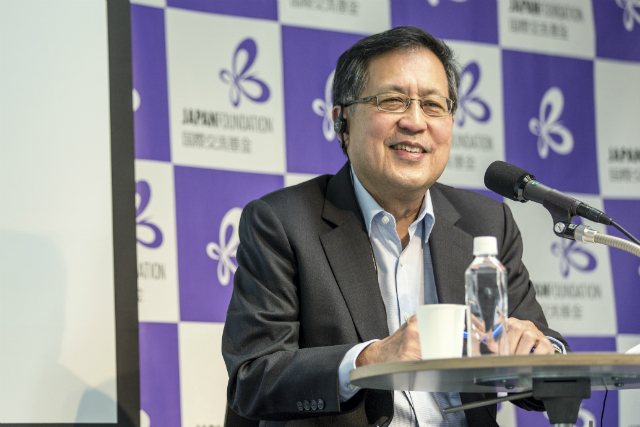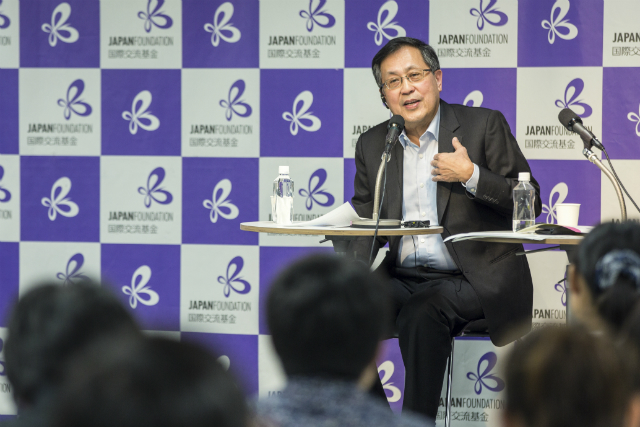The Significance of 1956
This year [2016], we are celebrating the 60th anniversary of the establishment of diplomatic relations between Japan and the Philippines. This agreement is commonly discussed, in the Philippines, as forgiving Japan and its army for its occupation and crimes committed, and accepting Japanese war reparations as settlement of their past mistakes. However, I suggest we view this Philippine-Japan tie in 1956 from another angle; to juxtapose it with another event that took place that year: the passing of Senate Bill No. 438 which spotlighted José Rizal*7 and his writing.
*7 José Rizal (1861-1898) is a Filipino writer, and propagandist who fought for liberal reforms and equality with the Spanish. His notable works are the novels Noli Me Tangere [Touch Me Not] of 1887 and its sequel El Filibusterismo [The Filibustering, translated as The Reign of Greed by Charles Derbyshire in 2005] of 1891, both of which dealt with the tyranny of Spanish Catholic priests and the failure of the colonial government to address local grievances. It is said that these publications fomented Filipino separatist sentiments, for which Rizal was blamed and executed on December 30, 1898. Considered martyrdom, Rizal's death inspired Filipino resistance to colonial rule for decades to come, and, as such, he is widely known as a national hero.
Bill No. 438, also known as the Rizal Bill, stipulated that courses on the writer and his novels be made mandatory in all educational institutions in the Philippines. I'm sure you will immediately ask, "What does that possibly have to do with Philippine-Japan relations?" To answer this, let us revisit the speech Ricarte made after his return from exile in Yokohama in 1942.
Lamenting how American colonial education—its "benevolent assimilation"*8 and democratic tutelage, as they put it—over the past forty years had led the Filipino youth to forget or misunderstand the events and heroes of the 1896 Philippine Revolution, Ricarte stated,
*8 The Benevolent Assimilation Proclamation was issued by United States 25th President William McKinley on December 21, 1898 and announced in the Philippines on January 4, 1899. Issued after defeating Spain in the Philippine Revolution, the Benevolent Assimilation Proclamation indicated the United States' intention to exert sovereignty over the Philippines.
I have long been waiting for this opportunity to narrate to you a true rendering of the heroic deeds that were performed by your parents.... The fact is that America taught our youth to remember the past through the lives of men like Lincoln and Washington in order to make us forget, in our hearts, the shining accomplishments of the great heroes of our country here in the East.... Honor the heroes and martyrs of your country [i.e. not of America].... This is clear to everyone and needs to be carried out always.*9 [Emphasis added]
*9 Author's translation of Artemio Ricarte, Sa Mga Kabataang Filipino [To the Filipino Youth], Manila, 1942.
Ricarte's views on the "bad" effects of American education and his reference to national heroes resurfaced during the heated debates in 1956 over the enactment of Bill No. 438 involving the State, Church, and the public. Proponents echoed Ricarte in giving prominence to the heroes of the revolution against Spain and in criticizing the effects of American education on the youth. The opponents, on the other hand, argued that the Philippine-American forces that fought against Japanese occupation were heroes and martyrs in their own right and should be given prominence today.

Senator Decoroso Rosales (1907-1987), for example, complained that the Rizal Bill was only dividing Filipinos who had been united in the fight against Japan. "Only a few years ago," he said "with thousands of other catholic Filipinos, we chose to gamble everything dear to us in the fight against Japanese invaders...I am sure that 95% of those heroes did not read the Noli Me Tangere and the El Filibusterismo."*10 In other words, he insisted, Filipinos did not need Rizal or his ideology to risk their lives fighting Japan for their country.
*10 For the original quote in Spanish, see Reynaldo Ileto, "El debate sobre el 'Proyecto de Ley Rizal' de 1956 y la influencia de los tres imperios en Filipinas (The 'Rizal Bill' Debate of 1956 and the Specters of Three Empires in the Philippines)," in Maria Dolores Elizalde and Josep Delgado (eds.), Filipinas: Un Pais entre Dos Imperios [The Philippines: A Nation between Two Empires] (Barcelona: Edicions Bellaterra), 60.
The broader implication of this statement, however, is that if the struggle against Japan is held as the greatest moment of Filipino unity and patriotism, it must follow that the United States was its partner, its ally toward liberation and independence. The Rizal Bill undermined that very partnership and was therefore opposed.
Sponsors of the Rizal Bill, such as Senators José Laurel (in the photograph with Lolo Engracio) and Claro Recto (1890-1960), were keen to locate the Japanese occupation period within a larger time frame by relating it to earlier struggles: the fight against Spanish colonial rule and, later, the American occupation.
Laurel and Recto were born during the late Spanish colonial era (1521-1898) and thus were too young to fight in the Philippine Revolution and ensuing Philippine-American War. Their families, however, were deeply involved in both wars. Laurel and Recto asked, "What exactly did Filipinos die for in the war with Japan?" The answer was to be found in a deeper understanding of Rizal's thinking, which enabled a parallel to be drawn between the 1890s and the 1940s.
For Laurel and Recto, and by extension for Ricarte, the United States interrupted the Philippines' revolution against Spain, preventing them from a self-earned independence they had fought hard for. Rather than independence, this intervention and the subsequent Benevolent Assimilation Proclamation only situated the Philippines under the sovereignty of the United States. Their revolution was "unfinished" and the Philippine-American "alliance" was therefore built on the wrong foundations.
Furthermore, what differentiated Laurel and Recto from other prominent Filipino politicians in the mid-1950s, who were associated with the Filipino-American guerrilla movement against Japan, was, to repeat, their involvement with Japan: Laurel was President of the Japanese-sponsored Philippine Republic (1943-1945), while Recto was its Minister of Foreign Affairs. Thus, their positions allowed them to push for the re-education of the Filipino youth to continue the struggle of Rizal and the other heroes of the Philippine Revolution.
Senator Laurel, in his 1956 speech defending the Rizal Bill, simply repeated verbatim his 1943 views on history education:
Today, more than at any period of our history, there is a need for a re-dedication to the ideals of freedom and nationalism for which our heroes, from Dagohoy and Lapulapu to Rizal, Del Pilar, Bonifacio, and Mabini lived and died. The words of these nationalists have impressed upon our history the stamp of undying glory.*11
*11 Ileto, "El debate sobre el 'Proyecto de Ley Rizal' de 1956," 64l.

The debate over the Rizal Bill ultimately reveals that the pro-Bill side was drawing on the history of Rizal's fight against Spain, beginning with the GOMBURZA incident*12 in 1872 up to the declaration of independence in 1898. The anti-Bill side, on the contrary, was drawing on the history of the Filipino-American partnership in the war against Spain and Japan, leading to independence in 1946.
*12 A portmanteau of the surnames of priests Mariano Gomez, Jose Burgos, and Jacinto Zamora, GOMBURZA refers to their execution on February 17, 1872, by the Spanish colonial authorities on charges of subversion arising from the 1872 Cavite mutiny. José Rizal dedicated his El Filibusterismo to their memory.
Thus, in order to better understand the historical significance of the establishment of Japan-Philippines diplomatic ties in 1956, we have to link it to the currently ongoing war over historical memory: the momentary victory of an alternative—the passing of the Rizal Bill and an indirect critique against the United States—over the dominant shared history of a strong Filipino-American partnership.
Nevertheless, the dominant discourse still prevails. An excerpt from the speech of former US president George W. Bush before the Philippine Congress in October 2003 illustrates this. Requesting the assistance of the Philippine government in the invasion of Iraq, Bush framed his appeal by reviving the Filipino-American alliance.
America is proud of its part in the great story of the Filipino people. Together our soldiers liberated the Philippines from colonial rule. Together we rescued the islands from invasion and occupation. The names of Bataan, Corregidor, Leyte, Luzon evoke the memories of shared struggle and shared loss and shared victory. Veterans of those battles are here today. I salute your courage and your service....The United States and the Philippines have a proud history. And we face the future bound by the strongest ties two nations can share.*13
*13 Addresses and Remarks, 39 WCPD 1427 (October 18, 2003). United States 43rd President George W. Bush, "Remarks to the Philippine Congress" at the Joint Session of the Philippine Congress, Philippines House of Representatives (Manila, Philippines), October 18, 2003. Available at https://www.gpo.gov/fdsys/pkg/WCPD-2003-10-27/pdf/WCPD-2003-10-27-Pg1427.pdf.
For obvious reasons, Bush does not mention "Japan" in his speech, but it is precisely this Filipino-American alliance against Japan which he wanted to revive in his war against Iraq.
- Next Page
- The Past in the Present Crisis






